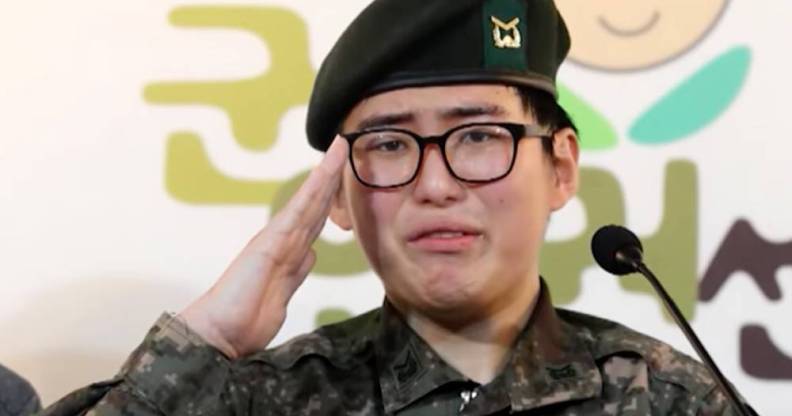South Korea told to ‘bear responsibility’ for trans soldier’s death and end LGBT+ discrimination

Byun See-Hoo, the first trans soldier in the South Korean military, lost a reinstatement appeal in 2020. She was found dead in her home in Cheongju, South Korea on 3 March 2021. (YouTube/Yonhap News Agency/Korea Now)
After the death of South Korean former soldier and trans woman Byun Hee-soo, authorities have been urged to bring forward more protections for LGBT+ people.
Byun was found dead on Wednesday (3 March), just over a year after she was discharged from the army for undergoing gender affirmation surgery.
Her untimely death prompted an outpouring of grief and calls for South Korea to protect its LGBT+ citizens by enacting anti-discrimination protections.
One post on the web portal Daum read: “The whole of Korean society bears responsibility for her death,” and called on those who made transphobic comments about Byun to reflect on their actions.
Seo Ji-hyun, a prosecutor who triggered South Korea’s #MeToo movement by going public over sexual harassment she suffered at the hands of her superior, wrote South Korea “could have saved” Byun.
“We could have saved her … We just had to let her live life true to who she was,” Seo said, according to the South Morning China Post, and called for an anti-discrimination bill “right now.
An anti-discrimination bill was proposed on 29 June, 2020, which would include protections for LGBT+ people. The bill would ban favouritism based on sex, race, age, sexual orientation, disability or religion as well as several more unusual criteria such as criminal history, appearance and academic background.
This is the eighth time that a bill on anti-discrimination has been submitted to the National Assembly since 2007. In past attempts, the inclusion of provisions outlawing LGBT+ discrimination was especially contentious.
Tributes for Byun Hee-soo, trans soldier found dead in South Korea
Following Byun’s death, the National Human Rights Commission issued a statement honouring Byun’s “fight against deep-rooted discrimination and hatred” and vowed to keep going with efforts to improve the system for LGBT+ people in South Korea.
Transgender youth group Tulip Solidarity promised to keep fighting for equality in South Korea, according to the Wall Street Journal. In a letter posted to their blog on Thursday (4 March), some 50 trans teens who interacted with Byun vowed to keep her memory alive in their work.
“We will not fear the path toward change that Staff Sgt Byun opened up for all transgender youth,” the group wrote.
Less emphatic were the words of the Ministry of National Defense, which offered condolences on Thursday (4 March). Colonel Moon Hong-sik, the ministry’s deputy spokesperson, said at a press briefing: “We express our sympathy.”
Byun, who was a tank gunner in Gyeonggi province, north of Seoul, was discharged from the army after undergoing gender affirmation surgery in January last year. She launched a landmark legal challenge against the South Korean army over her dismissal, but this was rejected in July.
Emergency services were alerted by a mental health counsellor that Byun had not been reachable since Sunday (28 February), according to South Korean news agency Yonhap. According to official reports, firefighters found her dead at her house in Cheongju, south of Seoul at 5.49pm on Wednesday (3 March).
The local mental health care clinic said Byun attempted suicide three months ago, according to Yonhap. No suicide note was found, and police are investigating the death.

A door cordoned by police line is seen at the home of late transgender South Korean soldier Byun Hee-soo in Cheongju on 4 March 2021. Byun, who was forcibly discharged from the army after gender-reassignment surgery, has been found dead, police said, prompting anger and calls for legal reforms. (Photo by HONG YOON-GI/AFP via Getty Images)
South Korea remains a deeply conservative country over matters of sexual identity and LGBT+ rights. Byun’s death has triggered an outpouring of grief and calls for the South Korean government to pass an anti-discrimination bill that would protect LGBT+ people.
Sunday (28 February) would have been Byun’s last day in the military if she had been allowed to stay in the service.
A woman, who said she had been Byun’s friend since they attended a military high school together seven years ago, told Reuters her friend was “destined to be a soldier”.
Kim, requesting only her surname be used due to privacy issues, said: “A military nerd, she was so knowledgeable about all things military, not just Korean troops but those in other countries, and worked so hard to restart her service.”
She added that Byun had been jobless because all of her job applications were rejected since she went public when the military discharged her in January 2020.
Byun had been awaiting a trial to reverse the military decision to ban her from service.
Moon also said that the military has not been in discussion on a rule change for transgender candidates.

